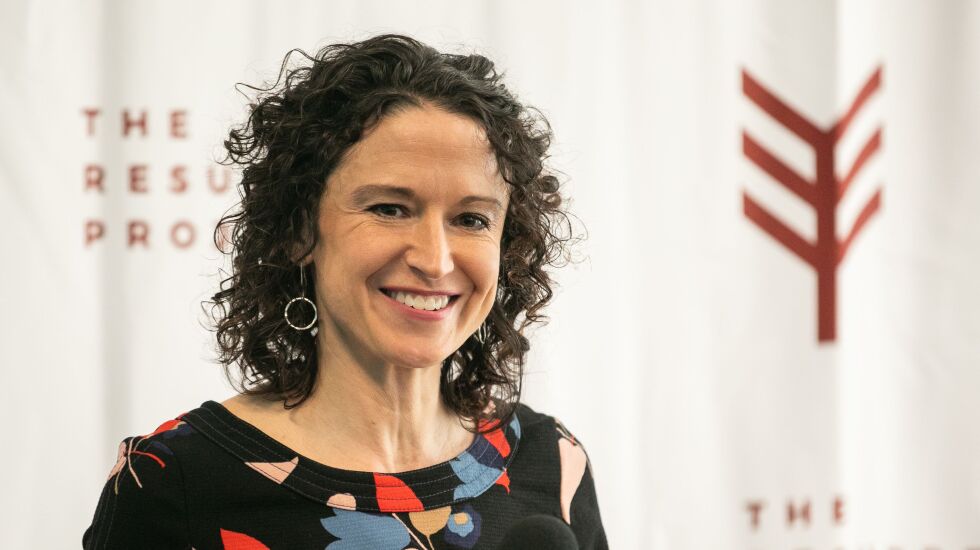
One of the most highly-regarded members of Lori Lightfoot’s cabinet is leaving Mayor Brandon Johnson’s administration.
Housing Commissioner Marisa Novara announced her resignation Tuesday after a four-year sprint that included leading Chicago through a pandemic that shined an even more glaring light on the city’s 120,000-unit shortage of affordable housing.
Novara did not return repeated phone calls, instead issuing a statement saying she was “proud of the work we have accomplished to advance housing as a human right.”
She pointed specifically to “acquisition of 18th & Peoria in Pilsen, the strengthening of the Affordable Requirements Ordinance to ensure affordability in high-income parts of the city, and the unprecedented 12 Equitable Transit-Oriented Developments on the South and West sides in our last funding round.”
Novara said it was “important for me to establish a vision for the equitable distribution of affordable housing citywide” and she is “incredibly grateful” to Mayor Brandon Johnson for his “clear commitment to continuing and deepening this goal.”
Novara helped draft Lightfoot’s housing platform while serving as a vice president of the Metropolitan Planning Council and overseeing a study on the $4.4 billion “cost of segregation” in Chicago.
It called for a graduated real estate transfer tax to “create a dedicated revenue stream” to reduce homelessness by 45% and begin to chip away at a 120,000-unit shortage of affordable units that was driving Chicago’s population decline.
Two months after taking office, Lightfoot pulled the plug on that promise.
She still planned to ask the Illinois General Assembly to empower Chicago to raise its real estate transfer tax on high-end home sales. But she planned to use the projected $120 million a year in new revenue to close the $838 million budget gap she inherited.
The campaign promise was broken.
Lightfoot got nowhere with the General Assembly. She spent the rest of her single term blocking efforts to put a binding referendum on the transfer tax on the Chicago ballot.
Novara spent the next four years doing the little things — including launching a $3 million Tiny Homes pilot — that chipped away at the affordable housing shortage.
“This is what I like to call ‘small density.’ We’re making it easier. We’re making it legal for people to actually use their coach houses for a rental unit or legalize their basement or their attic,” she once told alderpersons.
“We’re looking for ways to creatively address the need for units and ways to get at affordability that don’t involve waiting in line for low-income tax credits or waiting in line for housing choice vouchers, both of which are over-subscribed.”
Novara also did some big things.
She championed an overhaul of Chicago’s Affordable Requirements Ordinance that raised the bar for developers receiving city subsidies, city land or a zoning change and increased units large enough to accommodate families.
She pushed through a dramatically-enhanced transit-oriented development ordinance and gave renters up to 120 days’ notice before landlords terminate their leases or raise rents.
Yet another highlight of Novara’s tenure was Lightfoot’s plan to create $1.3 billion in affordable housing across the city.
There was also the 33-to-13 City Council vote to endorse a 297-unit residential development near O’Hare Airport that “made a statement” about affordable housing and zoning control by alderpersons.
During the pandemic, Lightfoot and Novara earmarked federal relief funds for several rounds of rental assistance. They convinced residential housing groups, landlord associations and lenders to sign a non-binding “Housing Solidarity Pledge” to show “flexibility and restraint” in dealing with one another during the unprecedented time of hardship to prevent COVID-19 from triggering another wave of foreclosures.
Participating landlords agreed to offer grace periods with terms that “avoided repayment at the end of the deferral period.” They also promised to waive late fees for missed payments and allow renters who missed payments to amortize those payments over time.
Through it all, Novara was a relentless champion for more equitable mortgage lending to break down the barriers of systemic racism.
During a City Council hearing on the issue in February, 2021, Novara pointed to a study by WBEZ Radio that showed that banks lend 12 cents in Black neighborhoods and 13 cents in Hispanic neighborhoods for every $1 they lend in white neighborhoods.
Novara said then that her “concern” was that study was followed by “lots of announcements of more money for South and West Side” communities.
“Don’t get me wrong: More investment in South and West side communities is clearly needed. But what’s also clearly needed is the painstaking, non-headline-grabbing, internal bank work of examining how your systems and structure are perpetuating racist outcomes and then solving for them repeatedly,” she said on that day.
“That’s what we really want and need to see. And that’s what our city deserves.”







